Banishing evil spirits, taming wandering ghosts, deity processions, Taiwanese opera and martial arts performances are among the events planned for the 2011 Taipei Xiahai City God Temple Cultural Festival (台北霞海城隍文化季), a month-long event that begins tonight at Dihua Street’s (迪化街) historic Xiahai City God Temple (霞海城隍廟).
The yearly festival is held to celebrate the City God’s (城隍) birthday, which is on the 13th day of the fifth lunar month (June 14 this year). All events are free and open to the public.
“This is a perfect opportunity to show Taipei residents that Taiwan’s folk culture isn’t only to be found in central and southern Taiwan,” said Titan Wu (吳孟寰), a spokesman for the temple.
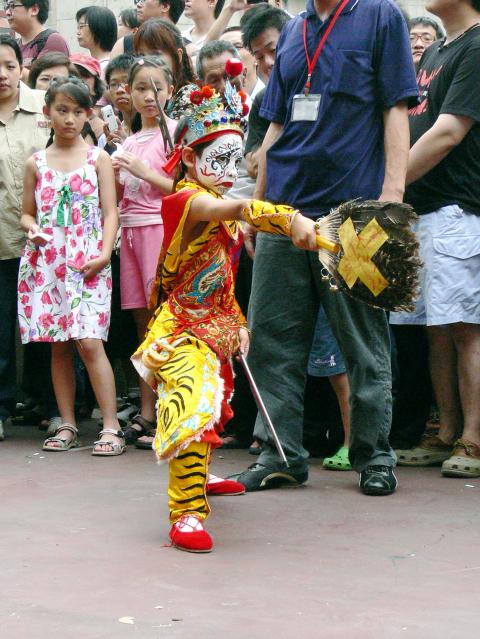
Photo Courtesy of Xiahai City God Temple
Celebrations get under way tonight with Ghost Buddha (鬼菩薩), a Taiwanese opera performance by Ming Hwa Yuan (Tien) Taiwanese Opera Co (明華園天字戲劇團). It will be shown on a stage in Yongle Square (永樂廣場) beside the temple.
On Tuesday, the temple will perform several rituals to cleanse the locality of evil spirits.
“Before removing the City God from the temple, we have to ensure the community is clean, and that means banishing ghosts and anything else that is impure,” Wu said.
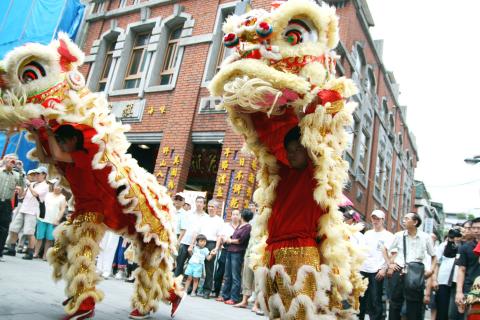
Photo Courtesy of Xiahai City God Temple
“Positioning spirit generals to protect the five earthly temples” (放軍安五營), a ritual in which heavenly generals are placed outside places of worship, will be held on that day to ensure the deity’s safety before its inspection tour, while the “night patrol” (暗訪夜巡), which begins at 5pm on June 12, features “eight generals” patrolling the City God’s territory to banish evil spirits.
The latter ritual, Wu said, provides a unique opportunity to watch these “ghost hunters” in action.
Once the area is cleansed of unwanted spirits, the temple’s City God statue will be removed for its inspection tour (繞境遊行) of Datong District (大同區) — an “energetic and boisterous” (熱鬧) procession complete with the liberal discharge of firecrackers and ritualized performance troupes flanking the statue’s palanquin, Wu said.
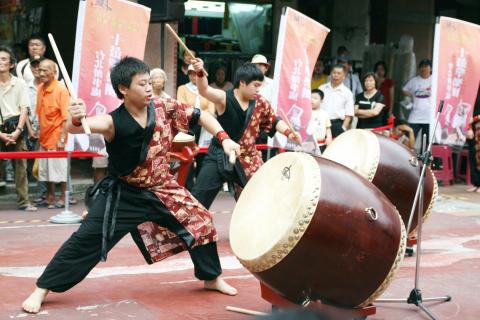
Photo Courtesy of Xiahai City God Temple
A number of other folk art performance troupes (陣頭) from across Taiwan will descend on the temple on June 11 for drumming performances, martial arts routines and dragon dances. The entertainment is meant to both attract Taipei City residents to the area and to amuse the deity.
The City God is said to keep a ledger of the good and evil done by mortals, watch over the movements of ghosts and demons in the underworld and protect the people of Datong District, where the temple is located.
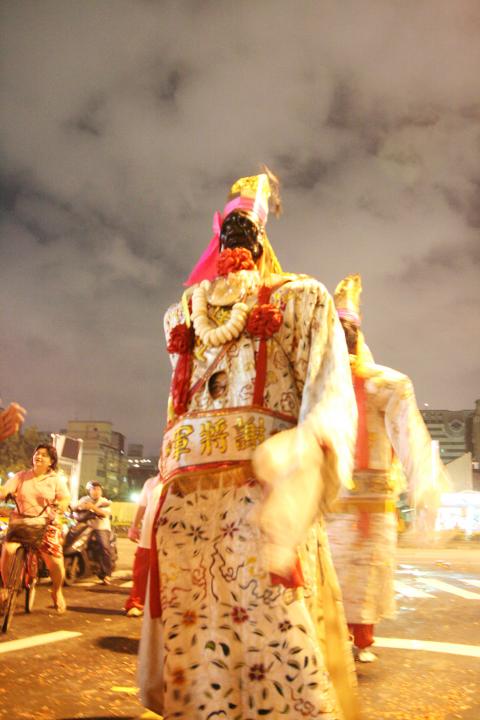
Photo Courtesy of Xiahai City God Temple
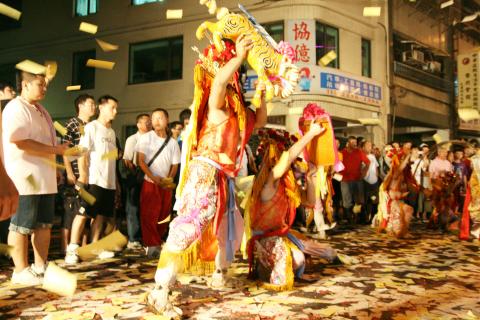
Photo Courtesy of Xiahai City God Temple
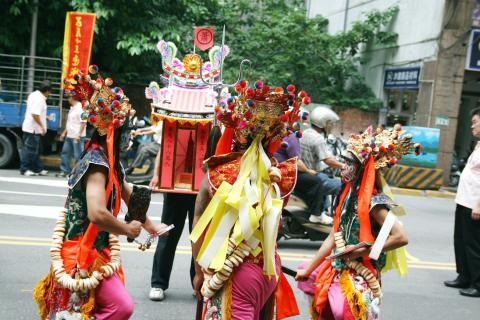
Photo Courtesy of Xiahai City God Temple

June 9 to June 15 A photo of two men riding trendy high-wheel Penny-Farthing bicycles past a Qing Dynasty gate aptly captures the essence of Taipei in 1897 — a newly colonized city on the cusp of great change. The Japanese began making significant modifications to the cityscape in 1899, tearing down Qing-era structures, widening boulevards and installing Western-style infrastructure and buildings. The photographer, Minosuke Imamura, only spent a year in Taiwan as a cartographer for the governor-general’s office, but he left behind a treasure trove of 130 images showing life at the onset of Japanese rule, spanning July 1897 to

One of the most important gripes that Taiwanese have about the Democratic Progressive Party (DPP) is that it has failed to deliver concretely on higher wages, housing prices and other bread-and-butter issues. The parallel complaint is that the DPP cares only about glamor issues, such as removing markers of Chinese Nationalist Party (KMT) colonialism by renaming them, or what the KMT codes as “de-Sinification.” Once again, as a critical election looms, the DPP is presenting evidence for that charge. The KMT was quick to jump on the recent proposal of the Ministry of the Interior (MOI) to rename roads that symbolize

On the evening of June 1, Control Yuan Secretary-General Lee Chun-yi (李俊俋) apologized and resigned in disgrace. His crime was instructing his driver to use a Control Yuan vehicle to transport his dog to a pet grooming salon. The Control Yuan is the government branch that investigates, audits and impeaches government officials for, among other things, misuse of government funds, so his misuse of a government vehicle was highly inappropriate. If this story were told to anyone living in the golden era of swaggering gangsters, flashy nouveau riche businessmen, and corrupt “black gold” politics of the 1980s and 1990s, they would have laughed.

In an interview posted online by United Daily News (UDN) on May 26, current Chinese Nationalist Party (KMT) Chairman Eric Chu (朱立倫) was asked about Taichung Mayor Lu Shiow-yen (盧秀燕) replacing him as party chair. Though not yet officially running, by the customs of Taiwan politics, Lu has been signalling she is both running for party chair and to be the party’s 2028 presidential candidate. She told an international media outlet that she was considering a run. She also gave a speech in Keelung on national priorities and foreign affairs. For details, see the May 23 edition of this column,